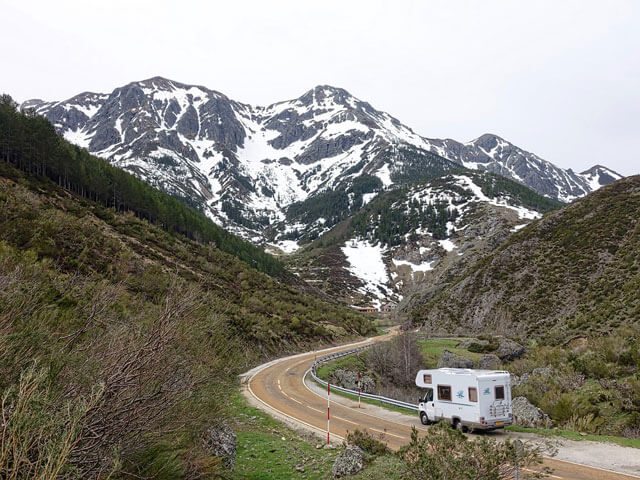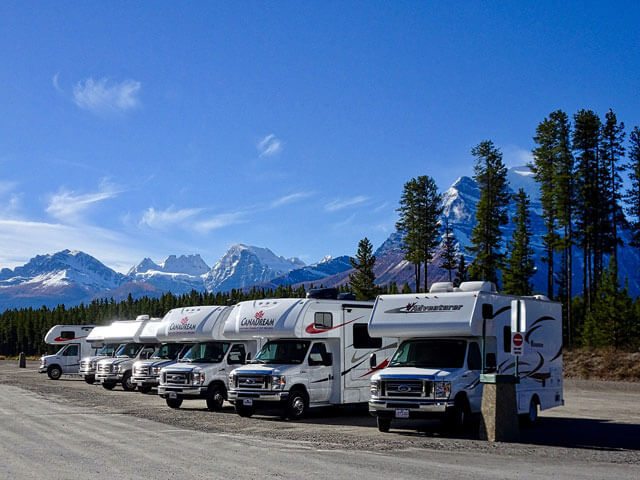Instagram, Facebook, and YouTube are full of millennials, retirees, and families living full-time on the road. The beauty of traveling attracts many, but there are several financial decisions you need to make before you hit the open road and consider full-time RVing.
Full-time RVing financial considerations
The age-old notion of traveling after you retire is fading away. Millennials are quitting their job and retiring early, to travel.
Perhaps you were a federal employee for years, and have a healthy Thrift Savings Plan and other benefits. Or, you saved the maximum amount in your 401(k) for years.
No matter your age, full-time RVing requires a financial plan. You have to plan for unexpected expenses on the road, inflation, market volatility, and even a possible recession.
It’s easy to see why people fall in love with full-time RVing. Waking up to different scenery every few days, weeks, or months is exciting. The world is at your doorstep.
However, there’s a financial aspect that you need to look at before hitting the road.
Will you keep your house?
Living on the road takes commitment. For many, hitting the road equals freedom. The freedom to explore the world, and financial freedom.
That’s why you may consider paying off your house first. If that’s an option. That way, nothing is holding you back from pursuing your dream of living on the road.
It’s a freeing experience to pay off your house and live debt free. It also allows you to have a safety net. You can keep your home, rent it out, and have a place to come home to if living on the road doesn’t work out.
Other full-time RVers go all in and sell their house and belongings before hitting the road. Selling your home gives you liquid cash (if you have equity in your home), to spend on the road. You can also use the money to purchase an RV, fifth wheel, or Airstream.
While living on the road sounds like an amazing opportunity, some people struggle with the small space and distance from a set group of friends. Families struggle because some kids find it hard to adapt to life on the road rather than being around their friends all the time. Roadschooling is not for everyone.
It isn’t a decision that should be taken lightly, as there are many financial considerations. Todd Minear, of Open Road Wealth Management was interviewed by The Wall Street Journal, for an article about full time RVing.
For some, the best financial decision is to keep their home and belongings at home and hit the road for a set amount of time. That way, they have a safety net.
Cost of an RV, fifth wheel, or Airstream
Once you decide if you’ll keep your house, you need to find a vehicle for travel. It can be a van, RV, fifth wheel, Airstream, or any other vehicle you feel comfortable living in.
Will you buy used or new? There are big cost differences. Depreciation is a big factor to consider. The minute you drive a new motorhome off the lot, it loses value. However, it may give you the peace of mind you need to avoid breakdowns on the road and added maintenance.
Once you decide if you’re going to buy a used or new one, consider how you are going to pay for the vehicle. Will you take out a loan, or will you tap into your savings or even retirement funds? There are fees if you take out your retirement money before you hit retirement age.
Once again, it comes down to living with debt or living debt free.
At Open Road Wealth Management, we like to think beyond numbers and cents. Who likes to budget anyway? So, here’s a better technique to make sense of these expenses and help guide your fulltime RV financial considerations.
Since you like the scenery, you’ll encounter on your never-ending road trip, visualize your expenses rather than thinking of them in terms of dollars and cents. This technique can help give your budget a makeover.
Once you know how much you should spend, do your research. There are lots of RV forums and blogs with other fulltimers sharing their experience with various vehicles and buying strategies.
Maintenance
Maintenance of your RV is directly tied to the type of vehicle you purchase. If you buy used, you may have more expenses because there’s more mileage on the vehicle compared to a new one. However, the maintenance costs may be lower than the upfront cost of a new vehicle and the depreciation.
You need to plan for the unexpected and should have money set aside for large unexpected maintenance costs.
How will you make money?
Many full-timers are entrepreneurs. They blog, become affiliates, sell products, or consult from the road with a remote job. Have a solid income stream before you hit the road. That way, you don’t hit any speed bumps along the way. Once you’re on the road, it’s hard to go back, especially if you sold your house.
You can also workamp. Workamper News trademarked the term, and it refers to working and camping. These jobs are flexible. You can work full-time or part-time, and most jobs are temporary so you can leave after a month or two.
You need to look at your income long-term. You’ll need money to pay for fixed costs like maintenance and daily living expenses, and then you’ll want to save cash for the future.
You may not need to work as much if you are retired or have money saved up. These financial decisions are based on your individual needs, wants, and investments.
Monthly expenses
You have fixed monthly expenses whether you live in an RV or you own a home. Consider your monthly fees for campgrounds, gas, food, and insurance. Don’t forget health insurance on top of your vehicle insurance. If you have a loan on your vehicle, add that in too.
To save money, you can boondock. It’s free camping mostly out in the boondocks or remote areas. This cuts down on campground fees, but don’t expect any amenities. It’s you, your car, and Mother Nature.
Make sure your expenses are less than your income.
Then add in discretionary spending such as entertainment and attractions. You’re on the road, so you’re going to see and do things.
Many fulltimers use blogs to share their journey on the road. They write about everything from their adventures to their monthly financial reports.
Do a financial review and set financial goals
Now that you know all that goes into traveling fulltime, let’s talk about the most important tip. While last on this list, it should be your starting point. I wanted to lay a framework for all the financial decisions you’ll have to make so your financial review is more detailed.
Do a financial audit or review before you travel fulltime. This will guide your decisions. How much money do you have invested and how much is in savings?
Finally, what are your financial goals short-term and long-term. We know travel is your short term goal, but how will you get there? Will you take out a loan for an RV or will you buy it with cash? If you pay cash, where will you get the money?
Spending time to lay out a financial plan and reviewing your current assets will help you make the right decision before you hit the road.
Don’t forget about investing while you’re on the road. Make sure you are not spending all the money you receive from consulting or workamping. Your life may not always be on the road so invest in your future even if you’re still not sure where life will take you.
You can do a financial review on your own, or use a financial advisor. Consumer advocates, including Consumer Reports, agree a fee-only advisor gives you the best advice without conflicts of interest. You pay this advisor a set fee so he makes decisions based on your best interests rather than his own interests like making a commission for selling you a financial product.
Once you have your finances set, hit the gas pedal and enjoy the open road!
Todd















